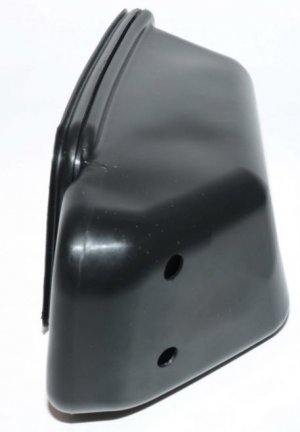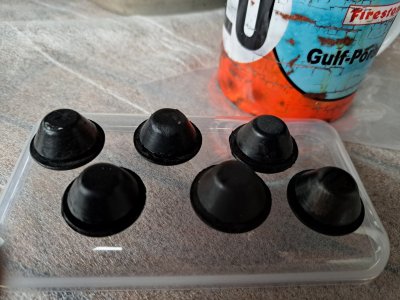It is not uncommon for driver or passenger to complain about gas and exhaust odors when driving in your coupe or sedan. Here are some tips to hopefully alleviate this issue:
The front of the coupe needs good rubber seals around the fresh air plenum, both of these are in front of the windshield. Also critical are the two rubber drain snorkels and the rubber blanking plugs in front of the hood latch mechanisms. This area needs to be airtight from the engine bay.
The trunk needs a good rubber seal as well as a good o-ring seal on the fuel level sending unit. Also, the pipe on the sender uses a plastic sleeve so that the 8mm fuel hose is tight to the pipe. The one that many ignore is the gas tank venting system. On US coupes the gas tank filler pipe has a hose that goes to the fuel vapor catchment tank on the right side wheel arch. From there a blue plastic line runs on the right side of the car and emerges in the engine bay in front of the passenger. From there it goes to the charcoal canister under the battery and then to the bottom of the air cleaner. There are four places where 6mm fuel hose is used between the plastic pipes and the hard points. Vacuum from the air cleaner draws fuel vapors contained in the trunk’s tank through the filter and into the engine. Even when a coupe is converted to FI it is good to have this system remain intact. The trunk seal prevents exhaust gases from being sucked into the trunk and into the passenger compartment while driving. Other areas that should be checked include:
Speaker holes in the rear parcel shelf. If those are not sealed properly by the speaker or if the speakers are damaged or removed that creates a direct opening into the trunk. There are several holes in the firewall through which wires or connecting rods pass through. Over time these disintegrate and create opportunities for fumes to pass through:
- The grommets through which wires pass through the firewall on the drivers side are often perished.
- The pedal box has a few areas with rods passing through potentially deteriorated grommets
- On fuel injected cars the DME wires pass-through on the right side. Another leak opportunity
The front of the coupe needs good rubber seals around the fresh air plenum, both of these are in front of the windshield. Also critical are the two rubber drain snorkels and the rubber blanking plugs in front of the hood latch mechanisms. This area needs to be airtight from the engine bay.
The trunk needs a good rubber seal as well as a good o-ring seal on the fuel level sending unit. Also, the pipe on the sender uses a plastic sleeve so that the 8mm fuel hose is tight to the pipe. The one that many ignore is the gas tank venting system. On US coupes the gas tank filler pipe has a hose that goes to the fuel vapor catchment tank on the right side wheel arch. From there a blue plastic line runs on the right side of the car and emerges in the engine bay in front of the passenger. From there it goes to the charcoal canister under the battery and then to the bottom of the air cleaner. There are four places where 6mm fuel hose is used between the plastic pipes and the hard points. Vacuum from the air cleaner draws fuel vapors contained in the trunk’s tank through the filter and into the engine. Even when a coupe is converted to FI it is good to have this system remain intact. The trunk seal prevents exhaust gases from being sucked into the trunk and into the passenger compartment while driving. Other areas that should be checked include:
Speaker holes in the rear parcel shelf. If those are not sealed properly by the speaker or if the speakers are damaged or removed that creates a direct opening into the trunk. There are several holes in the firewall through which wires or connecting rods pass through. Over time these disintegrate and create opportunities for fumes to pass through:
- The grommets through which wires pass through the firewall on the drivers side are often perished.
- The pedal box has a few areas with rods passing through potentially deteriorated grommets
- On fuel injected cars the DME wires pass-through on the right side. Another leak opportunity
Last edited:


